|
|
|
Sort Order |
|
|
|
Items / Page
|
|
|
|
|
|
|
| Srl | Item |
| 1 |
ID:
185266
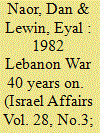

|
|
|
|
|
| Summary/Abstract |
Forty years after its occurrence, the 1982 Lebanon war remains academically understudied with the received wisdom about the conflict largely based on political and journalistic accounts. According to these accounts, the war was a political ploy by Defence Minister Ariel Sharon and Prime Minister Menachem Begin aimed at achieving far-reaching political goals rather than a defensive attempt to remove the terrorist threat to Israel’s northern areas. By placing the conflict within the context of Israeli history and the Arab-Israeli conflict, on the one hand, and the nature and characteristics of modern warfare, on the other, this article offers a more nuanced interpretation of the Lebanon War, showing that it was not fundamentally different from past military encounters.
|
|
|
|
|
|
|
|
|
|
|
|
|
|
|
|
| 2 |
ID:
129872
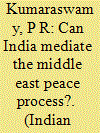

|
|
|
| 3 |
ID:
146856
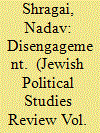

|
|
|
|
|
| Contents |
The disengagement and its disappointments have been part of public discourse in Israel for the past decade. Among the topics are: “Hamastan”; the nine thousand uprooted settlers; the 11,600 rockets fired at Israel and the eight military operations which followed. Nevertheless, an essential question remains unanswered: did Prime Minister Ariel Sharon implement this plan because he genuinely believed in it or were his motives based upon self-interest? Was his real aim to extricate himself from the criminal investigations against him? There are several schools of thought which have attempted to explain what ultimately led the prime minister to make this crucial decision. On the one hand, some, such as Defense Minister Moshe Ya’alon, believe that Sharon was motivated by “external considerations and personal distress,” and former Member of Knesset Zvi Hendel still contends that it was the investigations that led to the evacuation of the Gaza Strip. On the other hand, Dov Weisglass [occasionally spelled “Weissglass”], director of Sharon’s office, and Eyal Arad, Sharon’s strategic adviser, argue that such allegations are baseless and false. The purpose of this article is to present and review the opposing perspectives regarding the motivation for Sharon’s decision. Based on the available evidence, the author concludes that it is not possible to offer a definitive and unequivocal answer. However, it is important to present the differing views as they help us appreciate the diversity of vantage points involved both in making the decision and in the subsequent analysis of the disengagement.
|
|
|
|
|
|
|
|
|
|
|
|
|
|
|
|
| 4 |
ID:
151683
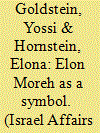

|
|
|
|
|
| Summary/Abstract |
While the establishment of the Elon Moreh locality in the second half of the 1970s constitutes an important milestone in the evolution of post-1967 Jewish settlement in the biblical lands of Judea and Samaria (or the West Bank as they have been known since their 1950 Jordanian annexation), the episode has been surprisingly neglected by the professional literature. This article seeks to fill that lacuna by exploring the factors and circumstances underlying this momentous event, as well as the political and legal struggles attending its occurrence. As such, it not only offers the first comprehensive historical account of this episode but also shed important fresh light on one of the more intractable aspects of the Israeli‒Palestinian conflict.
|
|
|
|
|
|
|
|
|
|
|
|
|
|
|
|
| 5 |
ID:
146858
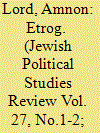

|
|
|
|
|
| Contents |
This article describes the protection and favor that the media and the courts extended to Prime Minister Ariel Sharon from the moment that he announced the disengagement plan in December 2003 up to and after the withdrawal from Gaza and part of northern Samaria in August 2005. Senior journalist and commentator, Amnon Abramovich pioneered the idea of treating the prime minister like an “etrog” (the citron which is blessed during the Feast of Tabernacles [Sukkoth]) and stored in cotton and gauze. This gentle handling enabled Sharon to carry out the evacuation of settlements and escape criminal investigations. The media thus shifted from reporting and commenting on events to becoming a supporter of the reversal of Sharon’s stated policy by delegitimizing opponents of the disengagement and preventing the public debate. Amnon Lord, currently a columnist of the weekly Makor Rishon and an editor of the Hebrew website, Mida, describes the ‘group-think’ mentality of many Israeli journalists and commentators and discusses the frequently deleterious role of the media in dictating the public agenda. In this process, the media found willing partners in the legal system which harmed democracy in Israel.
|
|
|
|
|
|
|
|
|
|
|
|
|
|
|
|
| 6 |
ID:
098066
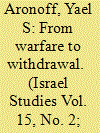

|
|
|
| 7 |
ID:
110121
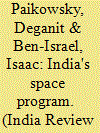

|
|
|
| 8 |
ID:
127939


|
|
|
|
|
| Publication |
2014.
|
| Summary/Abstract |
Israeli Prime Minister Ariel Sharon's unilateral disengagement from the Gaza Strip was a pivotal event not only in the development of the Israeli-Palestinian conflict, but also in Israel's domestic political discourse. Yet the act of withdrawal, which is seen by some in Israel as a misguided attempt to advance peace, or at least separation, is interpreted very differently abroad. This article evaluates the various narratives that emerged about the motives for disengagement, seeking to understand why diverging narratives arose. It also addresses broader theoretical questions about the use of unilateralism, particularly in the context of conflict resolution.
|
|
|
|
|
|
|
|
|
|
|
|
|
|
|
|
| 9 |
ID:
192895


|
|
|
|
|
| Summary/Abstract |
Thirty years after its euphoric launch, the ‘Oslo peace process’ between Israel and the PLO stands as the worst calamity to have afflicted Israelis and Palestinians since the 1948 war, and the most catastrophic strategic blunder in Israel’s history. By replacing Israel’s control of the West Bank and Gaza Palestinians with corrupt and repressive terrorist entities that indoctrinated their subjects with burning hatred of Jews and Israelis, as well as murdered some 2,000 Israelis and rained thousands of rockets and missiles on their population centres, the Oslo process has made the prospects for peace and reconciliation ever more remote. By deflating the combative ethos of the Israel Defence Forces (IDF), it has weakened Israel’s national security and made the outbreak of a multi-front war a distinct possibility. By transforming the PLO (and, to a lesser extent, Hamas) into internationally accepted political actors without forcing them to shed their genocidal commitment to the Jewish state’s destruction, it weakened Israel’s international standing. And by deepening Israel’s internal cleavages and destabilising its sociopolitical system, it has created a clear and present danger to the Jewish State’s thriving democracy, indeed to its very existence.
|
|
|
|
|
|
|
|
|
|
|
|
|
|
|
|
| 10 |
ID:
191899


|
|
|
|
|
| Summary/Abstract |
On June 6, 1982, Israel invaded Lebanon with the aim of destroying the military infrastructure of the Palestine Liberation Organization (PLO), which was serving as a launching pad for terrorist infiltrations and Katyusha attacks into northern Israel. From its outset, the Israeli public considered the war an exceptional case and a deviation from the “proper” course of Israeli history. Allegedly, unlike other Israeli wars, the 1982 War did not relate to Israeli security concerns but instead to the political aims and whims of Menachem Begin and Ariel Sharon. Also, it is often described as an unjust war of choice, which Israel initiated while it was not facing an existential threat. The claim that the 1982 Lebanon War was exceptional and a deviation from original Israeli principles is the main interest of this article. To determine whether the Lebanon War was a breach of Israeli history or a deviation from Israeli foundational political-moral principles, one must analyze the core tenets of Israel’s security strategy to which it adhered in most of its battles. Using the security doctrine as a guide map reveals that the conflict was neither unique nor a deviation but rather a fulfillment of long-standing Israeli security principles.
|
|
|
|
|
|
|
|
|
|
|
|
|
|
|
|
| 11 |
ID:
111599
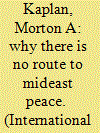

|
|
|
|
|
|
|
|